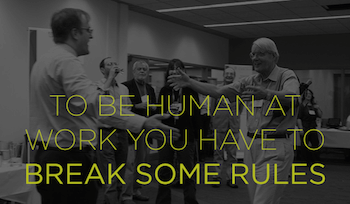To be human at work you have to break some rules
One of my team members has been facing significant health challenges. She spent most of this past month in a doctor’s office, and wasn’t working very effectively. I didn’t count her PTO days, or dock her pay. I sent her some flowers and prayed for her to get better.

Another one of my team members lost a close family member to a sudden and unexpected heart attack. We cried together at her desk — actually, pretty much the whole office was crying. She hasn’t been very productive in the weeks following. I’m not having a performance discussion with her. She’s grieving. I’m talking to the clients about cutting her some slack (and doing what we can to get the work done without her).
So what rules did I break? Well here’s “11 Rules for Hugging at Work“, we broke those. What about “Is it OK to cry at work” — shattered that one. But I don’t feel so bad. I’m not sure who’s writing these “rules” anyway. We do realize that our co-workers are humans, right?
Now I’m not saying the office is a place where we express 100% of our human-ness. There are a lot of human things we’d rather not have to deal with in the workplace. I hope I don’t have to deliver a baby in the office; and if you are having a romance, do it on your own time. The office is a place to work! When we come together in the workplace, we join an enterprise that shares a common purpose. In doing that, we agree that our behavior is going to be submitted to that purpose. For some people this is freedom! The fact that I don’t have to do my own accounting — that I can leave that to someone who loves accounting — is pretty magical. Together, we can do much more than we ever would alone.
Because we are engaged in that common purpose we sometimes have to limit our self-expression and act professionally. Our professional self might hold back on some of our more extreme feelings. We aren’t going to yell at someone; that would not be professional. We don’t dress the same way at the office that we would at home. Our professional self might have to do things that we don’t want to do, or that we wish we didn’t have to do. But the trade off is that we get to be part of an enterprise that can accomplish great things. The professional demeanor is a means to an end. It’s a compromise in favor of productivity.
And yet, underneath that shell, we are still human. There are situations which demand that your human-ness come out from under you professional shell. If we work together long enough, we are going to see our co-workers get married, have babies, and celebrate successes (outside of work). We are also going to see sickness, death, and other good-byes in their lives, or ours. All of these situations in their turn, require us to put aside the professional shell in favor of being vulnerable and human. We can all think of the heart stopping situations — positive or negative — which demand human-ness.
What do Robocop, Terminator, Cybermen, and iRobot all have in common? We don’t trust them — they aren’t human. They are programmed to accomplish one thing, at any cost. Imagine if, with the employee I discussed earlier, I kept every conversation with her not about how she was doing, but about what she was doing, when it would be done, and how I was going to be compensated for the drop in productivity. Think about that! I’d be a heartless monster. In order for us to build trust with our team members, we need to balance the need to maintain a standard of professionalism with the need to respect the humanity of our team. We need the capacity to temporarily put aside the goals of the business in order to support and affirm the humanity of the people who work with us and for us. Bosses who can maintain this balance — and the key is balance — enjoy a deeper level of respect, loyalty, and sincere appreciation from their employees.
Doing this — putting aside the professional shell in those poignant, human moments — also takes us out of the office hierarchy. When you’re grieving, or celebrating new birth, or your pie recipe gets published, or you have an apocalyptic flood in your basement — we aren’t boss-subordinate, we’re eye-to-eye, fellow sojourners in life. Maybe even friends. We can step out of our office roles; we might hug, or cry, or cheer. In fact, we must do this. Maintaining or asserting hierarchy is inappropriate in these situations.
Hear me: professionalism is good. We need it in order to be productive; after all, the only reason we are stepping out of our front door is to be productive. Together we can achieve more; and the whole team wants to succeed — to win. Professional should be our default demeanor (in the office). But part of being a true “professional” is knowing when to drop all those rules and be human.
Maybe it’s time for a new set of rules:
- Be professional. Don’t let your individuality get the the way of your team’s success. Don’t tolerate or demonstrate behavior that distracts the team from their goals.
- Be human. Don’t let productivity get in the way of connecting with your team when it really matters. Don’t tolerate or demonstrate behavior that fails to recognize anyone’s basic human needs.
OK, these rules still leave a lot of room for judgment. There is more gray in them than black and white. But isn’t that, really, part of what it means to be human?
How do you manage the balance between being productive and being human?
Photo credit: Alan Stanton

Could your leadership range restrain
the growth of your business?
Take our self-leadership assessment to identify opportunities
to grow your leadership (which could grow your business).
Get your results instantly without entering your email address.